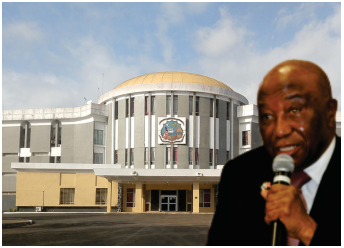By Bill W. Cooper
An American trained scholar, Dr. Robtel Neajai Pailey has stressed the need for the Executive and Legislative Branches of Government to revise Liberia’s Decent Work Bill and reverse its controversial ‘Harmonization Policy’.
Dr. Pailey also emphasized the importance of protecting workers’ rights and ensuring fair labor practices in the country.
Serving as Liberia’s 177th Independence Day Orator, Dr. Pailey cautioned, “Revising our Decent Work Bill, will ensure that our citizens’ rights are protected at all times.”
“Also ensure the revision of the monthly minimum wage from US$143 to at least US$250 as well as reverse Liberia’s so-called ‘harmonization policy’ because a country that pays its average workers below average salaries is setting itself up for failure,” she proposed.
She maintained, “We must also reform our pension and social security systems leading to a complete overhaul of NASSCORP; this way, the agency can serve all workers, including those in the informal sector who represent the backbone of our economy.”
She also said, “To members of our Legislature, meantime, go back to your districts and counties and engage in quarterly legislative dialogues so that you can report to the people you represent and hear directly from them.
“The House and Senate must have functioning websites with the names and contact information of all elected officials, including information on your legislative agendas, the bills you have sponsored and your voting records which will create a feedback mechanism for your constituents to hold you accountable,” she said.
The Orator also mentioned, “Most importantly, you can hold yourselves accountable by reducing your salaries by 20 percent and removing all line items from our national budget in which you do not perform your core functions of lawmaking and oversight and it would mean channelling funds for social service delivery directly to the counties to help them implement our sub-national development agendas.”
According to her, if the government does its part, then the citizens must also do theirs and asserted, “When I was growing up as an undocumented immigrant in Washington, DC, my humble and hard-working parents constantly reminded me that diligence and tenacity would be my ticket out of legal limbo.”
“They were right. How many of us actually value hard work? Some of us want jobs but refuse to put in the time and effort required to secure and maintain a career. When given the opportunity, we shirk our responsibilities and demand compensation for doing very little.
“We must change our ethics around work and propel our labor market into the next century. We must also enforce the Liberianization Policy by protecting Liberian businesses from the monopoly of foreign cartels,” she emphasized.
She stressed that protectionist policies should never give Liberian licence to lower their standards or accept mediocrity and as such, Liberians must constantly invent new ways to expand market outcomes and play an active role in our economy.
She then urged all Liberian entrepreneurs to see the heaps of trash dotted across Liberia as a business opportunity, noting, “See the generation of renewable energy (solar, wind, geothermal and biofuel) as an impetus for confronting the climate crisis. See the supply of clean potable water as a business opportunity.”
Meanwhile, Dr. Pailey is also encouraging the government to cancel contracts with poorly performing multinationals and renegotiate concession agreements that violate Liberian laws (including the country labor laws) and international human rights standards (including environmental governance) and that the agreements must be amended in consultation with affected communities and should yield improvements in tax collection.
She emphasized, “We must leverage increased domestic resource mobilization from these revised concessions to pay off internal and international debt, and clear our arrears at regional institutions that we founded such as the African Union (AU), Economic Community of West African States (ECOWAS) and Mano River Union (MRU).”
According to her, because corruption is not only rampant in the public and private sectors, it is enmeshed in our everyday human interactions, and noted, “We even use coded language and other euphemisms to conceal our misdeeds.”
“We often point the finger at our government, failing to realize that corruption begins in homes and communities, that corruption is a function of both poverty and greed, and that a corrupt regime is a reflection of a corrupt society.
“We must strengthen judicial bodies and integrity institutions by populating them with impartial patriots, name and shame those found guilty of evading public trust, force them to restitute stolen funds/resources and then send them to jail,” she advised.
Pailey furthered that, “High-level corruption, in particular, is like mass murder and we must treat it like the egregious crime it is because the rule of law is not some fashionable accessory we put on whenever it suits us; it is the protective armor we must carry every day in our ‘values-based revolution’.
Meanwhile, Pailey added that in addition to prosecuting people in a soon-to-be established National Anti- Corruption Court, we must also remove corruption-inducing expenditure from our budget such as inflated salaries for elected and appointed officials, imported vehicles, fuel and scratch card allotments.
These funds, according to her should be reallocated to doctors, nurses, teachers, and police officers who serve under- resourced regions of this country and that all government agencies must be audited, and elected and appointed officials should declare their assets for public scrutiny as a requirement for assuming office.

